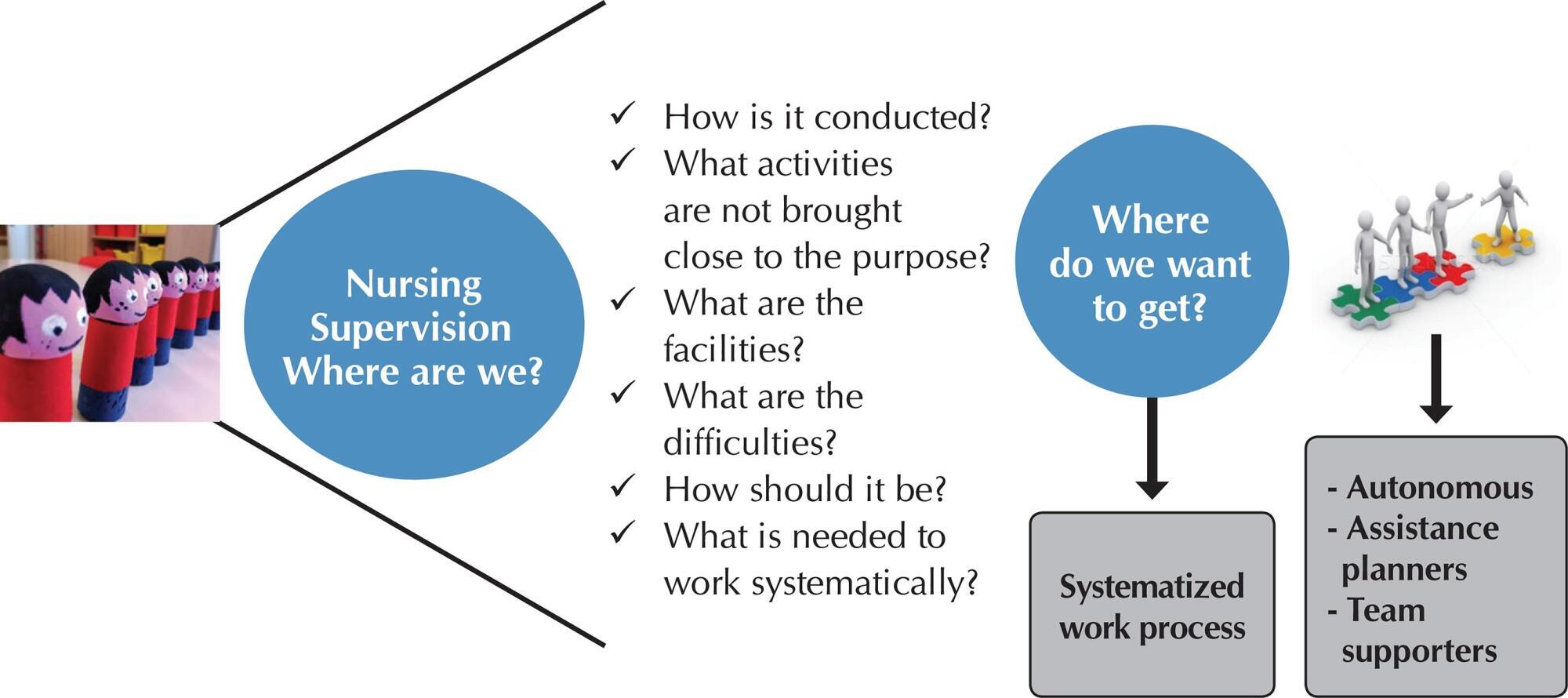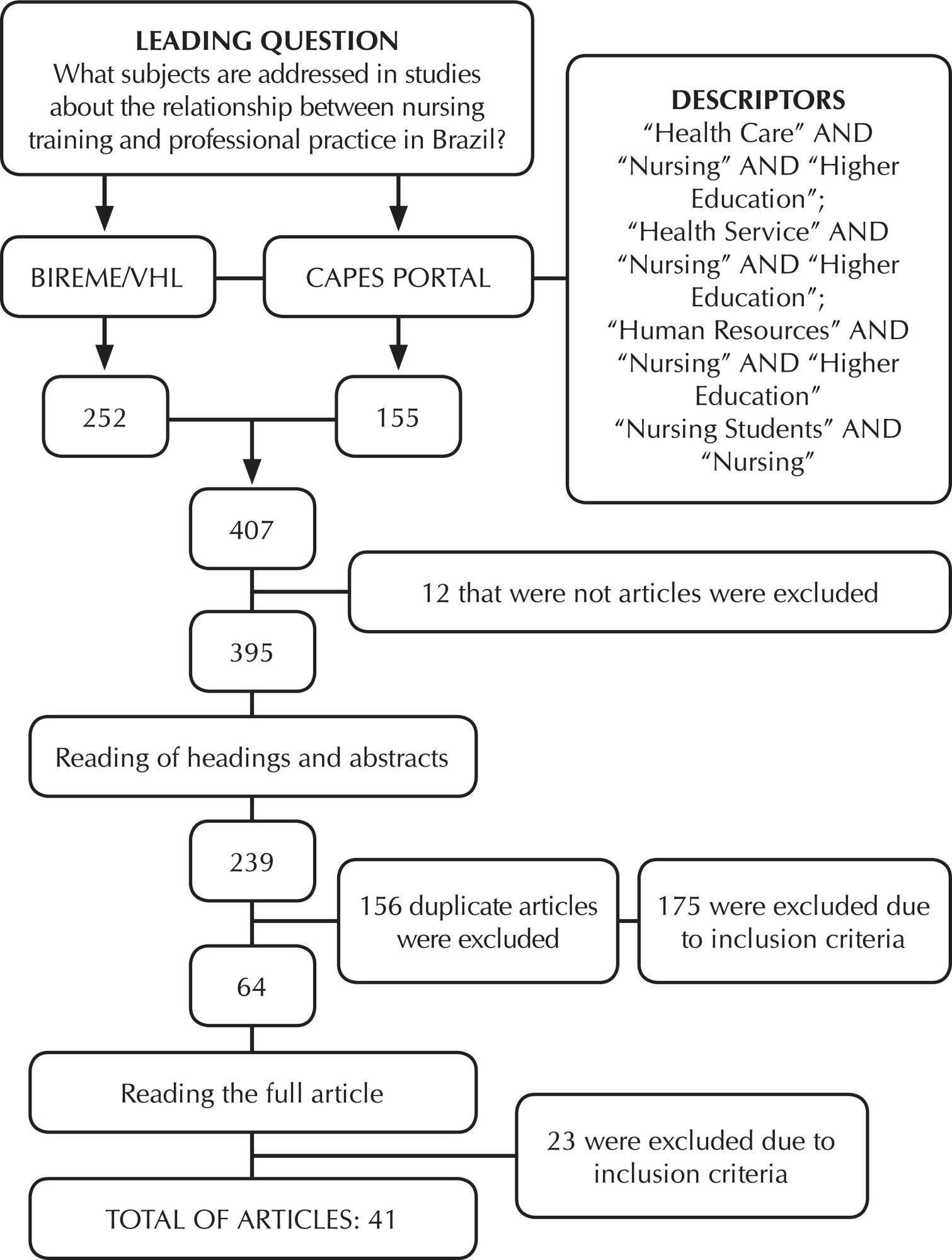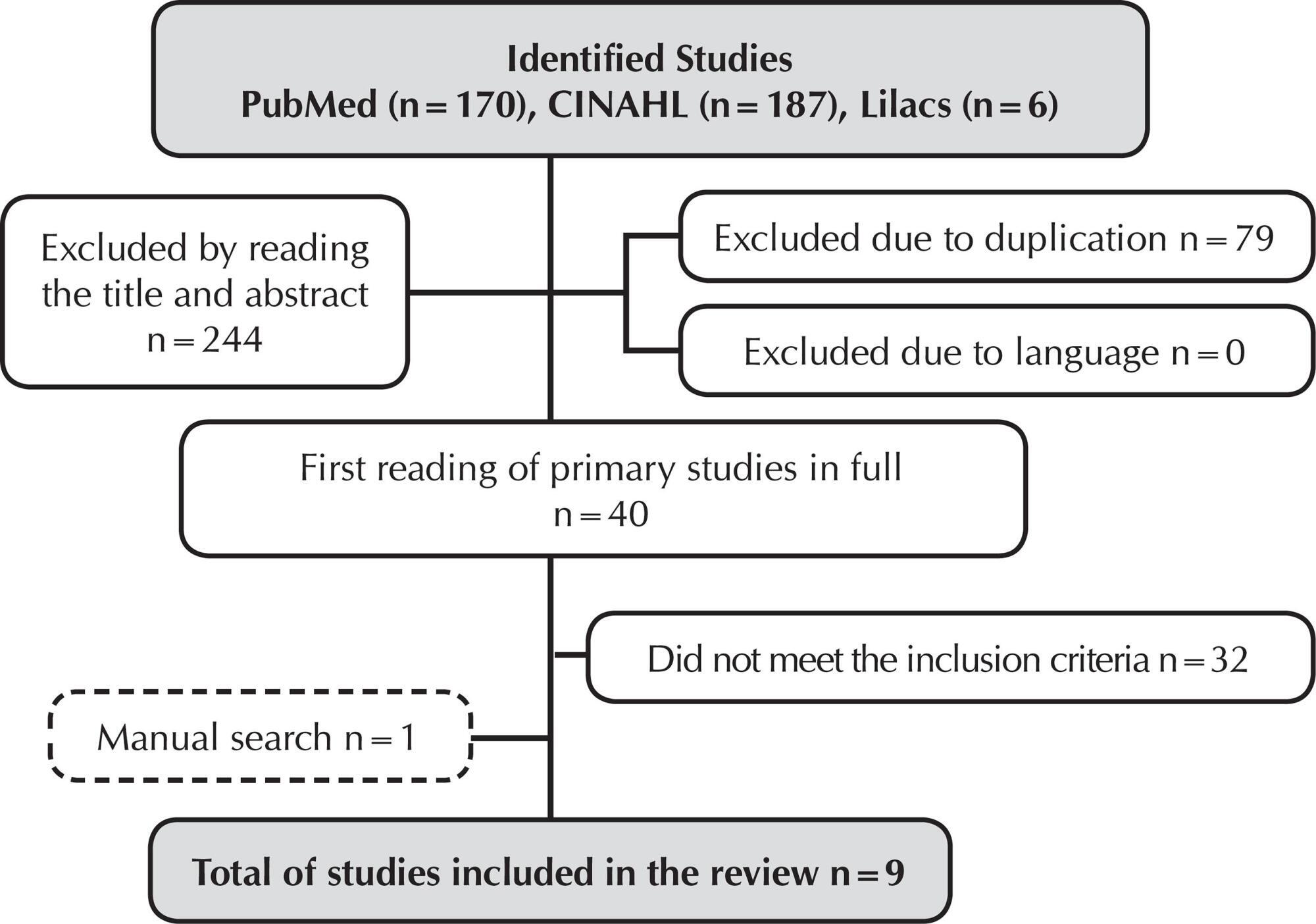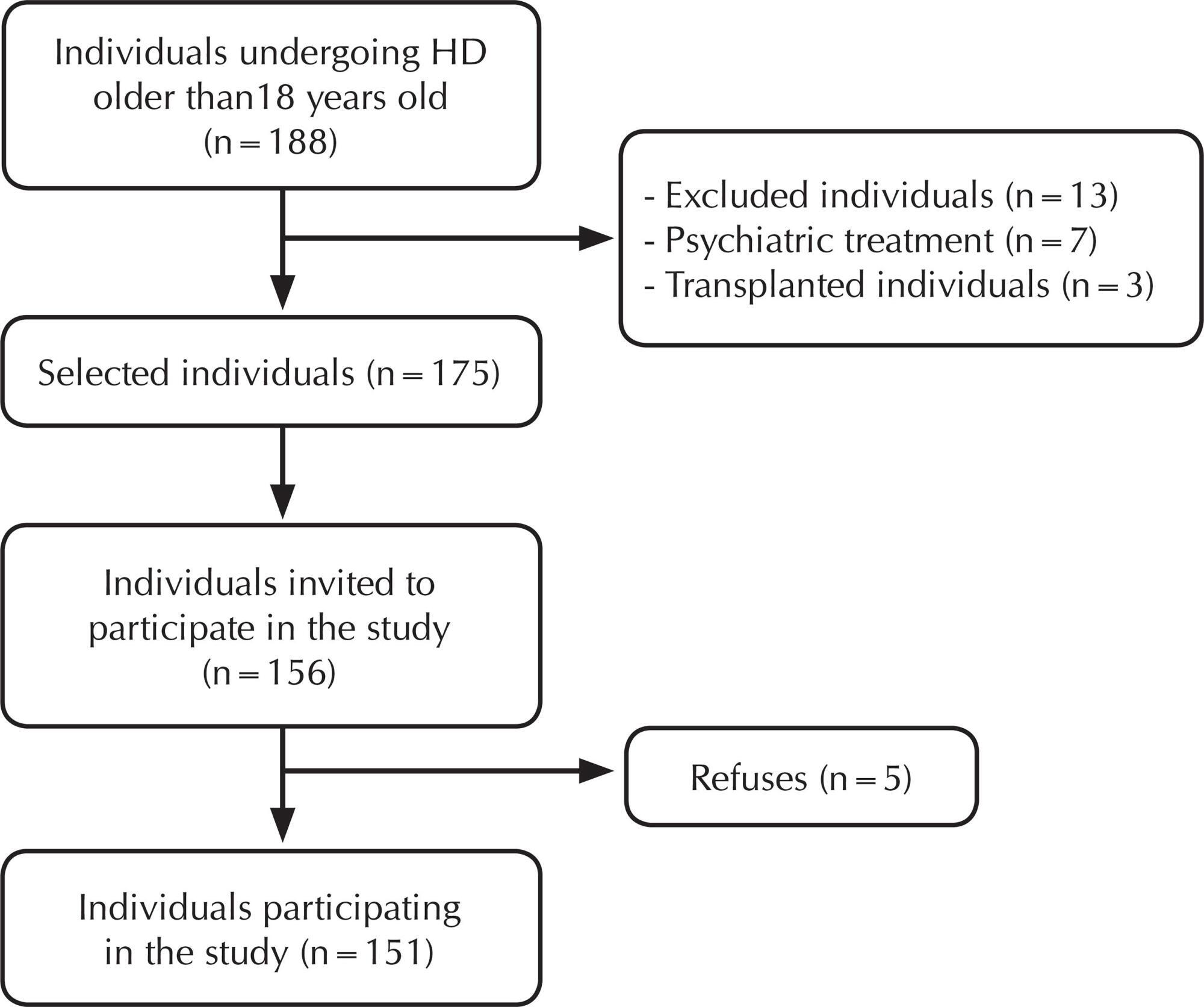-
01-01-2015
Quality of life and physical activity in intensive care professionals from middle São Francisco
Revista Brasileira de Enfermagem. 2015;68(1):26-31
Abstract
Quality of life and physical activity in intensive care professionals from middle São Francisco
Revista Brasileira de Enfermagem. 2015;68(1):26-31
DOI 10.1590/0034-7167.2015680104i
Views0See moreObjective:
the objective was to assess the level of physical activity (LPA) and the quality of life QL of the professionals who work in ICU.
Method:
this was a cross-sectional study carried out in Adult ICUs. LPA was assessed by the International Questionnarie of Physical Activity – short form (IQPA-SF) and the QL by the Medical Outcomes Study 36 (SF-36) questionnaire.
Results:
it was classified active 50.89% out of a total of 59 professionals. Nursing technicians were considered the most active with 60.6%. The QL of the professionals who were considered active were better when compared to inactives, with statistical differences to the category of physical aspects limitation, social aspects and mental health. The working hours were higher than recommend, the physicians were higher than the physical therapist, nurses and technicians nurses (p = 0.046).
Conclusion:
physically active professionals who work in ICU had higher quality of life probably why have lower hours of work and consequently more free time to engage in physical activity.

-
01-01-2015
Learning needs of Nursing students in technical vocational education
Revista Brasileira de Enfermagem. 2015;68(1):20-25
Abstract
Learning needs of Nursing students in technical vocational education
Revista Brasileira de Enfermagem. 2015;68(1):20-25
DOI 10.1590/0034-7167.2015680103i
Views0See moreObjective:
identify learning needs of students of Technical Vocational Education (TVE) in Nursing. Qualitative study conducted in a city of São Paulo state.
Method:
the subjects were students, teachers and coordinators of TVE and students of the bachelor degree who have had contact with TVE. Data collection was performed by questionnaire socioeconomic and cultural circles about the learning needs. For data analysis we used the content analysis.
Results:
it was found that students have difficulties contents not related to nursing as portuguese and mathematics, as well as introductory courses in the course of TVE which possibly may interfere negatively in learning specific content of nursing and the quality of health care.
Conclusion:
it is necessary to rethink the content taught and ways to teach from basic education, as well as the training of teachers who now works in the TVE.
-
01-01-2015
Serious game e-Baby: nursing students’ perception on learning about preterm newborn clinical assessment
Revista Brasileira de Enfermagem. 2015;68(1):13-19
Abstract
Serious game e-Baby: nursing students’ perception on learning about preterm newborn clinical assessment
Revista Brasileira de Enfermagem. 2015;68(1):13-19
DOI 10.1590/0034-7167.2015680102i
Views0See moreObjective:
to evaluate students opinion regarding e-Baby educational technology.
Methodology:
exploratory descriptive study in which participated a sample composed of 14 nursing Portuguese students that used e-Baby digital educational technology in an extracurricular course. To achieve the aim of the study, the data collection was realized through an opinion instrument in Likert scale including the possibility of commentaries by students. Is was also collected data of participants’ characterization.
Results:
students made very satisfactory evaluations regarding the game e-Baby, varying since usability acceptation through suggestions of expansion of the game to other nursing themes.
Conclusion:
serious game e-Baby can be considered a didactic innovation and motivator tool of learning. Besides, it demonstrates have adequate interface in design and educative function aspects, evocating intense interaction between user and computational tool.

-
01-01-2015
Challenges beyond the scientific knowledge production
Revista Brasileira de Enfermagem. 2015;68(1):7-8
Abstract
Challenges beyond the scientific knowledge production
Revista Brasileira de Enfermagem. 2015;68(1):7-8
DOI 10.1590/0034-7167.2015680101p
Views0For several decades, innumerous appeals and reflections on how to build the nursing science and achieve visibility in the scientific world led researchers to make efforts to produce knowledge that contributed to the well-being of people, improving their quality of life, relieving their suffering and transforming the reality in which we live. In addition to […]See more
-
ORIGINAL ARTICLE09-06-2024
Factors associated with burnout in military police officers in a city in Paraná
Revista Brasileira de Enfermagem. 2024;77(4):e20230510
Abstract
ORIGINAL ARTICLEFactors associated with burnout in military police officers in a city in Paraná
Revista Brasileira de Enfermagem. 2024;77(4):e20230510
DOI 10.1590/0034-7167-2023-0510
Views0See moreABSTRACT
Objective:
to analyze the association between burnout and sociodemographic, work factors, lifestyle habits and health conditions of military police officers in a municipality in the state of Paraná, Brazil.
Method:
cross-sectional research with 131 military police officers. Data were analyzed using the Statistical Package for the Social Sciences software and the R program. Chi-square, Fisher’s exact and Poisson Generalized Linear Model tests were used.
Results:
most participants (65.6%) had a high level of burnout. In relation to protective factors, those who carried out leisure activities had a 33.6% chance of not developing burnout. Conjugality was also a protective factor. Not practicing physical activity and leisure activities are factors that can contribute to the occurrence of burnout.
Conclusions:
important factors and high rates of burnout were observed in the police officers investigated. It is necessary to implement public health policies to reduce burnout with attention focused on this professional category.
-
ORIGINAL ARTICLE09-06-2024
Development and content validation of a risk classification instrument
Revista Brasileira de Enfermagem. 2024;77(4):e20230502
Abstract
ORIGINAL ARTICLEDevelopment and content validation of a risk classification instrument
Revista Brasileira de Enfermagem. 2024;77(4):e20230502
DOI 10.1590/0034-7167-2023-0502
Views0See moreABSTRACT
Objective:
Develop and validate the content of an instrument for patient risk classification in emergency services of Primary Health Care.
Method:
The study included two stages: item generation and content validity. A literature review and retrospective analysis of medical records were conducted to create the instrument items. The Content Validity Ratio (CVR) was used to assess agreement among judges during content validation.
Results:
In the first and second rounds, 75 and 71 judges validated the risk classification instrument, respectively. The minimum adherence score for the latent variable item based on the final number of judges was 0.22 and 0.18; thus, 52 items, divided into three classification categories (red, orange, and yellow), were retained.
Conclusion:
The instrument was considered valid regarding clarity, relevance, pertinence, and agreement regarding the severity indicated in the item.
-
REVIEW09-06-2024
Nursing students’ mindfulness and emotional regulation: an integrative review
Revista Brasileira de Enfermagem. 2024;77(4):e20230466
Abstract
REVIEWNursing students’ mindfulness and emotional regulation: an integrative review
Revista Brasileira de Enfermagem. 2024;77(4):e20230466
DOI 10.1590/0034-7167-2023-0466
Views0See moreABSTRACT
Objective:
to identify the scientific evidence available in national and international literature on the relationships between nursing students’ mindfulness and emotional regulation.
Methods:
an integrative literature review, in four databases, with a time frame from January 2002 to December 2022. Articles in English, Spanish and Portuguese available in full were included.
Results:
the sample consisted of six original articles, predominantly with a quantitative approach, with cross-sectional designs standing out.
Conclusion:
the synthesis of scientific production revealed that there is a lack of research at national and international level on the subject with experimental and qualitative designs that enable conclusions about cause and effect and/or take into account subjective experiences of the applicability of mindfulness-based practice in nursing students’ emotional regulation.

-
ORIGINAL ARTICLE09-06-2024
Nursing Process implementation in a gerontogeriatric context: qualitative research
Revista Brasileira de Enfermagem. 2024;77(4):e20230465
Abstract
ORIGINAL ARTICLENursing Process implementation in a gerontogeriatric context: qualitative research
Revista Brasileira de Enfermagem. 2024;77(4):e20230465
DOI 10.1590/0034-7167-2023-0465
Views0See moreABSTRACT
Objective:
to describe Nursing Process implementation in a faith-based senior living community.
Method:
strategic action research with 19 nursing professionals and three managers of a faith-based senior living community. Implementation took place in four phases: diagnosis, planning, implementation and assessment. The data collected through semi-structured interviews and focus groups were subjected to discursive textual analysis.
Results:
the central categories were constructed: Nursing Process in faith-based senior living community: diagnosis of knowledge and application; Nursing Process in faith-based senior living community: implementation; Nursing process in faith-based senior living community: assessment after its implementation.
Conclusion:
Nursing Process implementation made it possible to structure work management/organization, contributing to knowledge, organization and continuity of care for safety and professional support.
-
ORIGINAL ARTICLE09-06-2024
Adherence to sepsis protocol in a high-risk maternity reference center
Revista Brasileira de Enfermagem. 2024;77(4):e20230453
Abstract
ORIGINAL ARTICLEAdherence to sepsis protocol in a high-risk maternity reference center
Revista Brasileira de Enfermagem. 2024;77(4):e20230453
DOI 10.1590/0034-7167-2023-0453
Views0See moreABSTRACT
Objective:
To describe the adherence to the sepsis protocol by obstetric nurses in the obstetric triage of a high-risk maternity reference center.
Methods:
This was a quantitative, documental, and retrospective study involving 105 pregnant women treated in obstetric triage under sepsis criteria. Data were collected through electronic medical records using structured forms and were organized into tables employing descriptive statistics. This research adhered to ethical principles concerning human studies.
Results:
Of the checklists for initiating the SEPSIS protocol by obstetric nurses, 105 were identified. Regarding the protocol steps performed, lactate was collected in 97.1% of cases and blood cultures in 98.1%, antibiotic therapy was administered in 94.3%, and hydration was carried out in 51.4% of the cases.
Conclusion:
The initiation of the sepsis protocol for all women meeting the criteria was confirmed. However, the steps were not fully implemented as recommended by the institutional protocol, and the recommended broad-spectrum antibiotic was not administered.
-
ORIGINAL ARTICLE09-06-2024
Effect of Brazilian green propolis in chronic ulcer treatment: a randomized clinical trial
Revista Brasileira de Enfermagem. 2024;77(4):e20230418
Abstract
ORIGINAL ARTICLEEffect of Brazilian green propolis in chronic ulcer treatment: a randomized clinical trial
Revista Brasileira de Enfermagem. 2024;77(4):e20230418
DOI 10.1590/0034-7167-2023-0418
Views0See moreABSTRACT
Objective:
to assess the effectiveness of 5% Brazilian green propolis (ointment) in individuals with chronic ulcers.
Methods:
a randomized clinical trial, developed with 40 patients randomized equally to control group (treated with essential fatty acid) and experimental group (treated with 5% green propolis) for 30 days. The outcomes of interest were sociodemographic, clinical and laboratory characteristics, lesion characteristics, such as type of tissue in the bed, presence of exudate, edge characteristics, microbial content and pain.
Results:
regarding sociodemographic, clinical and laboratory characteristics, the two groups did not show statistically significant differences. After assessment in 30 days, an effect was observed for both treated groups, but for the experimental group, greater effectiveness in terms of the type of tissue in the bed, type of exudate, edge characteristics, microbial content and pain.
Conclusion:
propolis-based ointment showed a healing effect, presenting itself as a potential tool in healing chronic ulcers.
-
09-06-2024
Progress Test in nursing: perspectives for undergraduate education
Revista Brasileira de Enfermagem. 2024;77(4):e20230413
Abstract
Progress Test in nursing: perspectives for undergraduate education
Revista Brasileira de Enfermagem. 2024;77(4):e20230413
DOI 10.1590/0034-7167-2023-0413
Views0See moreABSTRACT
Objective:
to reflect on the perspectives of adopting the Progress Test in undergraduate nursing education.
Methods:
this is a reflective study, based on authors’ critical thinking and supported by national and international literature on the Progress Test application in undergraduate health courses.
Results:
the Progress Test is as a valuable teaching-learning strategy, with potential applications and benefits for students, professors, and academic management.
Final considerations:
systematic nursing education assessment indicates valuable information for different stakeholders. Understanding its potential benefits, the Progress Test is presented as a strategy that can be replicated in undergraduate nursing education, either individually, by institutions, or collaboratively, by the establishment of partnerships or consortiums of institutions.
-
ORIGINAL ARTICLE09-06-2024
Physical and psychological changes of the COVID-19 infodemic by the older adult population
Revista Brasileira de Enfermagem. 2024;77(4):e20230339
Abstract
ORIGINAL ARTICLEPhysical and psychological changes of the COVID-19 infodemic by the older adult population
Revista Brasileira de Enfermagem. 2024;77(4):e20230339
DOI 10.1590/0034-7167-2023-0339
Views0See moreABSTRACT
Objective:
to analyze the physical and psychological changes of the COVID-19 infodemic for the older adult population of Rio de Janeiro.
Method:
a cross-sectional, web-based survey to find out about access to news and information about COVID-19 among older adult in Rio de Janeiro, between July and December 2020. Univariate analysis and bivariate analysis were carried out using non-parametric statistical methods.
Results:
390 older adults took part, predominantly female (75.1%), aged between 66 and 75 (35.4%), married (51.0%), white (60.3%), owning their own home (81.8%), located in urban areas (91%), with complete or incomplete primary education (31.8%) and retired or pensioners (79.2%). Younger people were significantly affected both physically and psychologically by social networks when compared to television (<0.001).
Conclusion:
Physical and psychological changes from exposure to information about COVID-19 have affected the lives of the older adult, having an impact on this population.
-
REFLECTION01-01-2018
Advanced practices for care management: reflections on the Brazilian Nursing
Revista Brasileira de Enfermagem. 2018;71(4):2060-2065
Abstract
REFLECTIONAdvanced practices for care management: reflections on the Brazilian Nursing
Revista Brasileira de Enfermagem. 2018;71(4):2060-2065
DOI 10.1590/0034-7167-2017-0115
Views0See moreABSTRACT
Objective:
to explain about the Advanced Nursing Practice and to discuss the possibilities of the Advanced Practice for the management of nursing care in Brazil.
Method:
this is a theoretical-reflexive trial, based on the international literature on advanced practices in nursing and analysis relevant to the profession and to the Brazilian context.
Results:
the object of the study was described in the following driving axes: Advanced Practice Nurse: international examples and Brazilian reality; Reflections on the care management by the Advanced Practice Nurse in Brazil. Autonomy, qualified training, leadership and performance based on scientific evidences as the foundation of the best care management by the Advanced Nursing Practice, stand out.
Final considerations:
while early and challenging, the work of Brazilian nursing towards advanced professional practice seems to be interesting, since the possibilities of managing the care of this modality of nurses’ performance are evident.
-
REFLECTION01-01-2018
The Sociology of Pierre Bourdieu: theoretical potential for the subfield of nursing
Revista Brasileira de Enfermagem. 2018;71(4):2055-2059
Abstract
REFLECTIONThe Sociology of Pierre Bourdieu: theoretical potential for the subfield of nursing
Revista Brasileira de Enfermagem. 2018;71(4):2055-2059
DOI 10.1590/0034-7167-2016-0505
Views0See moreABSTRACT
Objective:
to approach the basic conceptions of Pierre Bourdieu’s sociology and its articulation with the subfield of nursing by focusing on managerial aspects.
Method:
reflections are based on the concepts of field, habitus, capital and symbolic power applied to the subfield of nursing by favoring the understanding of organizational dynamics and its agents.
Result:
health institutions are living structures in the adverse social world where nursing agents’ interests express their way of thinking and acting according to the place they occupy in the organization. These spaces of fight and symbolic violence tend to inculcate ideologies that meet these agents’ interests.
Final Considerations:
The proposition theory is fruitful to reflect the practice of management by unveiling the relationships and role that organizations establish about their agents. She warns about the possibility of seeing changes in the subfield of nursing.
-
EXPERIENCE REPORT01-01-2018
Workshops as a democratic proposal in order to change the supervision work in nursing
Revista Brasileira de Enfermagem. 2018;71(4):2050-2054
Abstract
EXPERIENCE REPORTWorkshops as a democratic proposal in order to change the supervision work in nursing
Revista Brasileira de Enfermagem. 2018;71(4):2050-2054
DOI 10.1590/0034-7167-2017-0286
Views0See moreABSTRACT
Objective:
to report the experience of developing workshops as an intervention strategy in an action research, aiming to review the work of supervision in hospital nursing.
Method:
to report of the experience of planning, developing and evaluating workshops with a psychosocial approach. Three workshops were held, in a reserved place, with the participation of 21 supervisors of a public university hospital. Each workshop was organized with heating, day work, closure with syntheses and consensus.
Results:
the work provided the exchange of experiences, reflections and proposals for difficulties identified in the work process that distract supervisors from the management of assistance such as communication failure, reworking and lack of definition of assignments in the team.
Conclusion:
the dynamics of the workshops favored supervisors to propose solutions to the difficulties of their practice in a more democratic and participative way, through dialogical interactions, sharing of the feelings pertinent to the work context and establishing consensus for the completion of the task.

-
REVIEW01-01-2018
Nursing training and professional practice: an integrative review of literature
Revista Brasileira de Enfermagem. 2018;71(4):2039-2049
Abstract
REVIEWNursing training and professional practice: an integrative review of literature
Revista Brasileira de Enfermagem. 2018;71(4):2039-2049
DOI 10.1590/0034-7167-2016-0504
Views0See moreABSTRACT
Objective:
to identify themes addressed in studies on the repercussions of nursing training in professional practice in Brazil.
Method:
this is a qualitative research, following the assumptions of Ganong’s Integrative Literature Review (1987). The keywords or terms “Health Care” were used; “Nursing”; “Higher Education”; “Teaching in Higher Education”; “Health Service”; “Human Resources” and “Nursing Undergraduates” in consultation with the Virtual Health Library and the CAPES Portal of Journals. Sixty-four studies were found, of which 41 met the inclusion criteria.
Results:
in the analysis, three themes were highlighted: pedagogical processes and the role of professors and students; curricular structure in nursing education; management of health training.
Final considerations:
we observed the need to incorporate the Brazilian Unified Health System (SUS) principles and directives in nursing education in the country so that the training is consistent with the needs of professional practice. The study points out to the challenges that emerge with this incorporation.

-
REVIEW01-01-2018
Competences and Barriers for the Evidence-Based Practice in Nursing: an integrative review
Revista Brasileira de Enfermagem. 2018;71(4):2030-2038
Abstract
REVIEWCompetences and Barriers for the Evidence-Based Practice in Nursing: an integrative review
Revista Brasileira de Enfermagem. 2018;71(4):2030-2038
DOI 10.1590/0034-7167-2016-0617
Views0See moreABSTRACT
Objective:
To analyze knowledge, attitudes, practices, and frequent barriers to the implementation of the Evidence-Based Practice among nursing assistants in the hospital.
Method:
This is an integrative review, whose search for primary studies occurred in the PubMed, CINAHL and LILACS databases. For the analysis, cross-sectional observational studies were included in English, Portuguese and Spanish, published in nursing journals, from January 2007 to July 2016.
Results:
The search resulted in 363 articles, including nine primary studies. The sources of recurrent evidence among care nurses were: personal experience and local care protocols. These professionals presented weaknesses in the implementation of the Evidence-Based Practice related to the lack of knowledge for evidence evaluation, work overload and resistance to change of practice.
Final considerations
Nurses presented favorable attitudes, however, with little knowledge to perform the Evidence-Based Practice. Results can support interventions for its implementation in the hospital.

-
REVIEW01-01-2018
Impact of venous ulcers on patients’ quality of life: an integrative review
Revista Brasileira de Enfermagem. 2018;71(4):2021-2029
Abstract
REVIEWImpact of venous ulcers on patients’ quality of life: an integrative review
Revista Brasileira de Enfermagem. 2018;71(4):2021-2029
DOI 10.1590/0034-7167-2017-0516
Views0See moreABSTRACT
Objective:
To analyze knowledge gathered about the impact of venous ulcers on patients’ quality of life.
Method:
Systematic bibliographic review study with an integrative approach. Databases of MEDLINE, LILACS, IBECS, CINAHL Complete, Web of Science, Scopus, and CUIDEN Plus were used for selection with the PICOT guiding criteria, through the DeCS and MeSH: adult, aged, varicose ulcer, and quality of life, in Portuguese, Spanish, and English. The inclusion criteria were: full original articles available in the databases selected with adherence to the theme in Portuguese, Spanish, and English, published from 2007 to 2016.
Results:
The sample included 14 national and international articles with different methodological approaches and investigative contexts, published from 2012 to 2016.
Conclusion:
Chronic venous ulcers act on patients’ bio-psycho-social-spiritual and socioeconomic spheres, having a negative impact on their quality of life.

-
RESEARCH01-01-2018
Nursing diagnoses of patients with kidney disease undergoing hemodialysis: a cross-sectional study
Revista Brasileira de Enfermagem. 2018;71(4):2014-2020
Abstract
RESEARCHNursing diagnoses of patients with kidney disease undergoing hemodialysis: a cross-sectional study
Revista Brasileira de Enfermagem. 2018;71(4):2014-2020
DOI 10.1590/0034-7167-2017-0225
Views0See moreABSTRACT
Objective:
to identify Nursing Diagnoses of 5th stage chronic kidney disease patients undergoing hemodialysis.
Method:
cross-sectional, descriptive and quantitative study carried out with 151 patients undergoing hemodialysis in a clinic specialized in nephrology from the Northwest of the Paraná State. Nursing Diagnoses were determined through Nanda-I in which had the percentage greater than 50%. The analysis used was the simple statistics.
Results:
17 Nursing Diagnoses were identified, emphasizing the risks present in 100% of patients: risks for electrolyte imbalance; ineffective kidney perfusion; infection: vascular injuries, adverse response to the iodine-based contrast-enhanced and impaired urinary elimination.
Conclusion:
the main diagnoses listed reflect the more frequent risks that patients undergoing hemodialysis are exposed to. Being aware of these risks allows the nursing planning with early interventions, in order to prevent complications related to the disease and to promote best life conditions.

-
RESEARCH01-01-2018
The process of dying/death: intervening conditions to the nursing care management
Revista Brasileira de Enfermagem. 2018;71(4):2005-2013
Abstract
RESEARCHThe process of dying/death: intervening conditions to the nursing care management
Revista Brasileira de Enfermagem. 2018;71(4):2005-2013
DOI 10.1590/0034-7167-2017-0173
Views0See moreABSTRACT
Objective:
To exhibit the factors that influence the Nursing care management in the face of death and the process of dying/death of hospitalized adults in the medical-surgical units for hospitalization.
Method:
The Grounded Theory was applied with the theorical support of the Complex Thinking Theory. Data have been collected through semi-structured interviews from May, 2015 to January, 2016 with three sample groups totaling 41 participants: nurses, assistant nurses and members of multidisciplinary group. Data analysis followed the steps of open coding, axial coding and selective coding.
Results:
The category “Pointing out the interfaces of care management to patients in process of death/dying and their families” and its respective subcategories show the complex interactions established by the nurse due to the Nursing care management.
Final considerations:
Subjective, educational, sociocultural and institutional conditions influence the nurse interactions, causing order/disorder on care management.
Search
Search in:
Nuvem de Tags
Adolescente (85) Atenção Primária à Saúde (239) COVID-19 (91) Criança (91) Cuidados de Enfermagem (269) Educação em Enfermagem (151) Educação em Saúde (139) Enfermagem (930) Enfermagem Pediátrica (86) Estudantes de Enfermagem (77) Estudos de Validação (131) Família (87) Idoso (208) Promoção da Saúde (99) Qualidade de Vida (104) Saúde do Trabalhador (86) Saúde Mental (145) Saúde Pública (82) Segurança do Paciente (150) Tecnologia Educacional (100)



